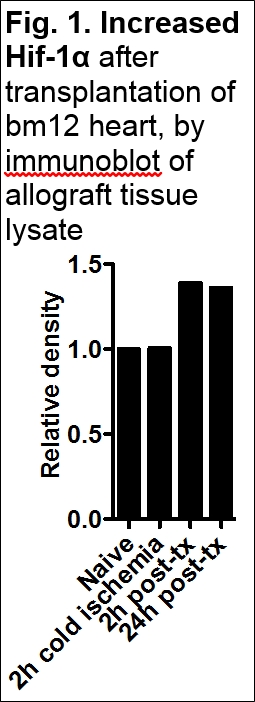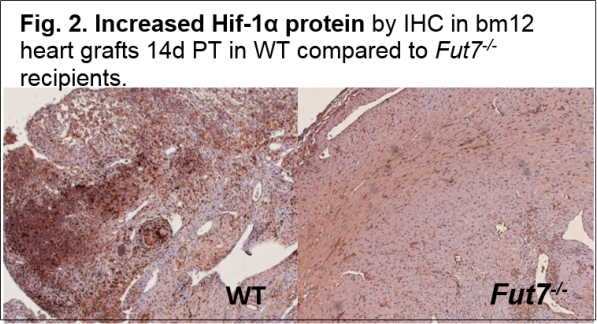Hif-1α Stabilization in the Recipient Accelerates Cardiac Allograft Rejection.
Northwestern University, Chicago.
Meeting: 2016 American Transplant Congress
Abstract number: 96
Keywords: Heart preservation, Inflammation, Ischemia, Lymphocyte activation
Session Information
Session Name: Concurrent Session: Chronic Allograft Rejection: Animal Models
Session Type: Concurrent Session
Date: Sunday, June 12, 2016
Session Time: 4:30pm-6:00pm
 Presentation Time: 5:42pm-5:54pm
Presentation Time: 5:42pm-5:54pm
Location: Room 309
Introduction: Increased Hif-1α mRNA expression in deceased-donor organ transplant tissue prior to or soon after transplantation significantly correlated with primary graft dysfunction. HIF-1α is positioned to be a key player in the integration of TCR- and cytokine receptor-mediated signals involved in CD4+ helper lineage commitment and CD8+ effector differentiation independent of oxygen availability. We investigated the role of Hif-1α expression and stabilization in heart infiltrating leukocytes in ischemic conditions and in transplantation.
Methods: Ischemic injury to the mouse heart was induced by ligating the LAD, 7 days later Hif-1α expression analyzed by RT-PCR in PMN, Ly6Chi and CD4 T cells extracted from the hearts, sham operated mice were used as controls. To study the role of Hif-1α in transplantation we transplanted single MHC-II mismatched bm12 hearts into B6 recipients or FucTVII KO recipients with impaired leukocyte trafficking.
Results: Following myocardial ischemia, there was upregulation of Hif-1α mRNA in leukocytes infiltrating the heart [PMN (2.04 fold), Ly6Chi(6.53 fold) and CD4(4.17 fold)] compared to sham. In the context of transplantation, Hif-1α protein expression is increased both at early (2h, 24h, Fig. 1) and late time-points (14 days, Fig.2) post-transplantation and is reduced in recipients with impaired leukocyte trafficking. Hif-1α stabilization by Dimethyloxaloglycine (DMOG) a prolyl hydroxylase inhibitor led to accelerated rejection of heart allografts with a median survival of 5 days compared to 53.5 days in controls (p=0.0008).
Conclusions: Hif-1α is stabilized in the heart after ischemia prior to transplantation and both early and late after transplantation. Stabilization of Hif-1α after transplantation precipitates acute rejection. These data suggest that Hif-1α plays a critical role in alloimmune responses.


CITATION INFORMATION: Ilyas Z, DeBerge M, Dehn S, Wang J.-J, Zhang Z, Thorp E, Ansari M. Hif-1α Stabilization in the Recipient Accelerates Cardiac Allograft Rejection. Am J Transplant. 2016;16 (suppl 3).
To cite this abstract in AMA style:
Ilyas Z, DeBerge M, Dehn S, Wang J-J, Zhang Z, Thorp E, Ansari M. Hif-1α Stabilization in the Recipient Accelerates Cardiac Allograft Rejection. [abstract]. Am J Transplant. 2016; 16 (suppl 3). https://atcmeetingabstracts.com/abstract/hif-1-stabilization-in-the-recipient-accelerates-cardiac-allograft-rejection/. Accessed March 5, 2026.« Back to 2016 American Transplant Congress
